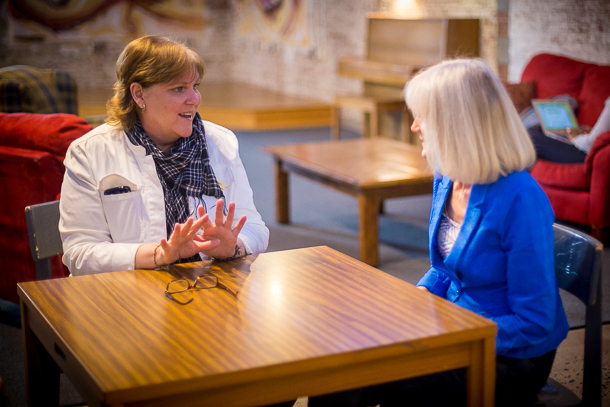Restorative justice within schools can’t exist in a vacuum, says Kathy Evans, an assistant professor of education at Eastern Mennonite University (EMU), in a Dec. 29, 2015 article in The Atlantic. Schools also have to address the campus climate issues that contribute to student behavior, she says.
The article, titled “When Restorative Justice Works,” profiles restorative justice as an alternative school-discipline program which is gaining popularity in public schools across the United States. [EMU graduates involved in restorative justice in education were profiled in this Summer 2015 issue of Crossroads.]
At Pittsfield Middle High School in New Hampshire, “justice committees” staffed by peer mediators and advised by teachers and administrators hear cases of low-level infractions (the example used in the article involves a student who used another student’s cell phone to send hateful messages).
But Pittsfield’s restorative justice (RJ) initiative is part of a larger focus on “student-centered learning,” which has transformed the educational environment.
Evans, who heads EMU’s graduate education program that focuses on restorative justice in school settings (known as restorative justice in education, or RJE), says in the article that the implementation of an RJE program needs to be holistic, focused on transforming the school climate and culture, and also sustainable. It isn’t a quick and easy process that can be implemented after a one-day training, she says. Building healthy relationships between all members of the learning community – students, teachers, administrators, caregivers – takes time.
RJE programs have shown considerable improvement in keeping students in schools, but even the Los Angeles Unified School District, the second largest in the country, has dealt with difficulties related to teacher training and support after a district-wide adoption of the program.
Pilot programs, such as the one at Augustus F. Hawkins High School led by Center for Justice and Peacebuilding graduate and restorative justice counselor Joseph Luciani that made national news last year, are often successful because they are slowly implemented, generally one school at a time, with sufficient training so that teachers feel comfortable applying what they’re learning and then getting continual support as they continue to learn.
Individual teachers, too, can be successful in implementing restorative justice in their classroom (read about three teachers, all graduates of EMU, here.) However, a growing number of districts are moving towards the adoption of restorative justice practices after the January 2014 endorsement of the U.S. Department of Education with a 27-page report, Guiding Principles: A Resource Guide for Improving School Climate and Discipline.
That’s one reason why Evans and others in the RJE met last summer to begin outlining plans for a national association. The goal is to support grassroots efforts and to ensure that there’s both consistency and accountability for restorative justice programs in schools.
In addition to a graduate certificate offered at EMU and EMU Lancaster, both campuses also offer a concentration in RJE within the masters of education degree. This summer, both sites will also host a Restorative Justice in Education Academy June 27-28 in Harrisonburg, and June 30-July 1 in Lancaster. The academy, which is sponsored by the MA in Education program, is for anyone interested in working toward developing restorative justice practices in schools.
For more information, contact the education department at rje@emu.edu.
